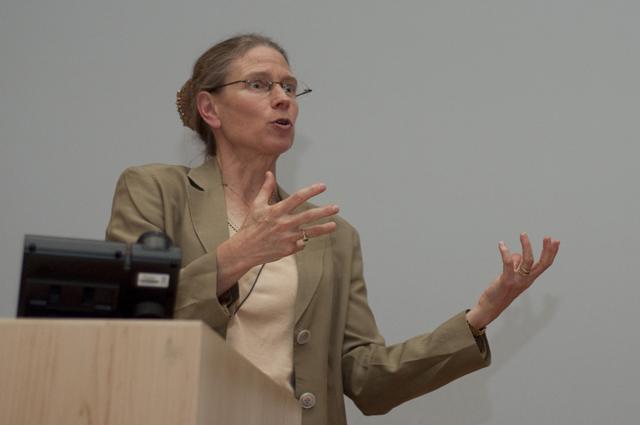 " />
" />
PHOTO BY CHRIS RUPERT
Frances Seymour, former Director General of the Center for International Forestry Research speaks on the importance of forests and food security April 16, 2013, at the Hunt Library Auditorium. "It's clear that reconciling forest protection, food security, and climate change is like a giant optimization problem. It requires understanding how global commodity supply chains for food grains, vegetable oils, mineral oils, and wood energy have all converged and sometimes interact in surprising ways when governments try to incentivize particular kinds of production and consumption."
FORESTS MATTER TO FOOD SECURITY, GROWING ECONOMIES AND ENVIRONMENTAL SUSTAINABILITY
Part of the Norman Borlaug Series, Frances Seymour, former director of Center for International Forestry Research, spoke about the external influences on the conditions of forests and their roles in food security snd climate change at Hunt Library Auditorium Tuesday afternoon.
Indonesia served as a common reference point for Seymour due to its large population, carbon emission rates and expansive forests, all of which contribute to deforestation and environmental problems.
Forests have a significant impact on food security, although there is not a lot of talk about it, Seymour said.
“The role of forests and climate regulations is even that much more important,” Seymour said. “You would think that given all of these contributions of forests to food security and to agriculture, more generally, and local landscapes, conserving forests would be an important part of food security policy, but they are not.”
Seymour said misconceptions about forests’ roles in food security often contribute to lack of policy dealing with forestry and regulating demolition of forests.
“It serves the interest of some actors to have you believe that forestry protection and food security are incompatible,” Seymour said. “There are two convenient untruths. One is that you have to sacrifice forests to feed the world, and the other poor people are the main cause of deforestation.”
Forestry graduate student Garik Sadovy said he has noticed the effects of these misunderstanding in politics.
“A lot of students, faculty and policy-actors outside of the forestry sector have a wishy-washy feeling toward forestry,” Sadovy said.
Lawmakers have adopted this uneasy feeling toward sustainable forestry, even though forests have the capability to provide the solution to food security and climate change issues, Seymour said.
“Forests contribute a large share to food security and boost provisions of ecosystem services to agriculture, but that forests do not yet have a commemorative seat at the table in food security debate,” Seymour said.
Seymour also said people tend to forget that forests provide access to hunting and are a huge factor to the citizens’ incomes, especially women’s in some countries.
“Food security isn’t just about the availability of food, but the incomes that comes from the forest,” Seymour said. “A large portion of that income is particularly important to women who often derive their share of household cash by gathering, processing or trading forest products.”
Following the lecture, Seymour opened the auditorium for relevant discussion, in which students actively participated.
“I enjoyed stepping back and being able to take a broad view of issues and where our future research needs to be directed,” Lawson Creekmore, a graduate student in forestry, said.
Jaakko Nippala, a graduate student in forestry, said he was glad that there was a discussion about potential solutions to deforestation.
“If we accept the fact the world is doomed, then it means it is going to be [destroyed],” Nippala said.
Seymour said that there was a lot more work to be done to save the planet’s forests.
“We need to do much more research and much more raising of awareness about the role of forests in contributing to food security and to resilience in natural disasters,” Seymour said.
Sadovy said he decided to come to the lecture because he is a huge fan of Borlaug, the ecologist for whom the lecture series was named.
“I have a great respect for him and what he did and his life story,” Sadovy said.
Seymour said she was glad to get an input from the audience about what she has been researching and lecturing.
“The most fun part of the talk is to interact with people listening and pushing back and challenging some of what I have said.”